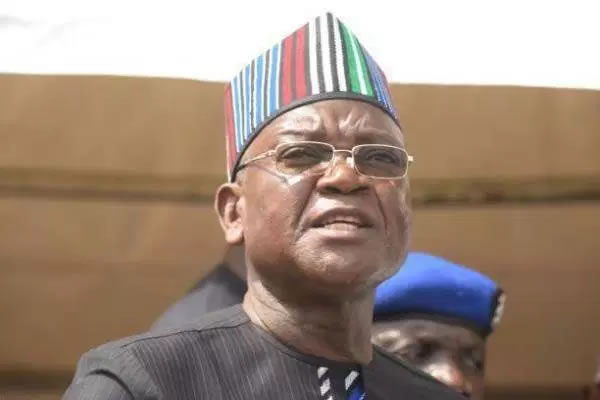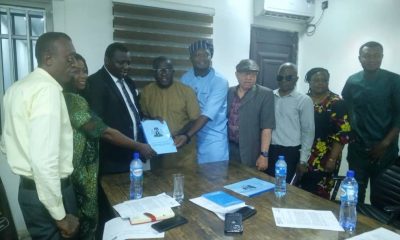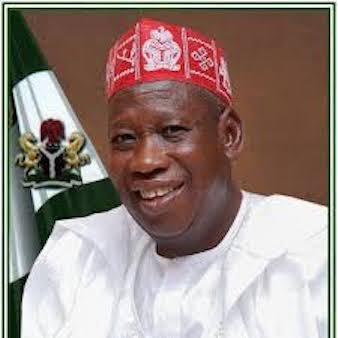OPINION
Ortom’s Second Term and The Task Before Him

As Benue State Governor, Samuel Ortom takes oath of office today to mark the commencement of his second term, our correspondent CHRIS GAGA, examines his first term in office and the expectations of Benue people from his last term as governor.
It was on the 29th May 2015 when governor Samuel Ortom ascended the throne of power as the 5th democratically elected governor of Benue State.
Today makes exactly four years after, and governor Ortom having rewarded a renewed mandate by the sovereign people of Benue State will be taking the oath of allegiance for the second time as executive governor of the food basket state.Of course his reelection by the people of Benue state may be a clear pat on the back and a repose of confidence that the governor has tentatively performed optimally during his first term, after all, reelection into such offices ought to be the collective resolve of the people to reward hard work in terms of performance. Thus, whether this was the basis for his reelection or not, it is probably not the crux of this analogue.
While the event of his inauguration for the second term is historic, many Benue people may rarely see his second term as a time for consolidation, but rather a time for the governor who is said to have performed poorly in his first term to cut his stint in the annals of development of the state. No doubt, the expectations from the Benue masses are high.
Considerably, a cursory throwback on governor Samuel Ortom’s first four years in office becomes key as he renews his oath to occupy the Benue Peoples House in the next four years. This perhaps may give the people insights into what the governor is set to achieve for the state in his last term.
Memorably, the governor in his first term had a developmental blueprint christened, “Our Collective Vision for a greater Benue.” This blueprint had five cardinal areas of focus which encompasses; Agriculture-driven Industrialization, Steamed Based Education, Security, youth empowerment and job creation, and Improved Infrastructure. But while the governor has obviously done well and is applauded in the area of Security, it has remained a tantalizing mirage as to whether any of the other cardinal areas of his blueprint have been implemented even averagely.
Largely, his efforts in tackling insecurity is the greatest achievement of his first term. This is cognitive of the peoples Anti-Open Grazing and Ranches Establishment Law as firmly implemented by his. administration. His amnesty program which yielded minimal impact is never to be left out, same as his dexterity in handling internal and inter-border disputes recently.
Although the governor has listed his achievements in the various sectors of Agriculture, education, health, infrastructure, youth empowerment and employment, his critics and many other Benue citizens say such achievements as highlighted in his scorecard are not feasible. His critics may be fair, they may not.
But while it will be highly unfair for anyone to say the governor has failed woefully in his first term, it is definitely not out of place to say the state deserve better developments than where it is staggering presently.
Positively, the Benue State governor is not unaware of the task ahead of him in his next four years in office. He has admitted repeatedly that costly “mistakes” were made in his first term, but “lessons” have been learnt, and he was ready to relaunch Benue into its pride of place amongst other states in his second coming.
Of course, one of the major problem governor Samuel Ortom promised and was expected to tackle in his first four years, which is the welfare of Benue workers has remained unsolved but rather degenerated. Benue workers are now owed salaries to the tune of 5 months(state), 10 months(Teachers), 11 months(LGs), and over 14 to 18 months(pensions) respectively as against 3 months(state), 4 months (local government) he inherited in 2015.
Investigations also have shown that the first term of governor Ortom administration is alienated from the rural areas. There seems to be little or no government presence at the grassroots, a situation that has caused gross decay in rural infrastructures such as feeder roads, bridges, lack of electrification and other basic amenities in spite of claims that his government has carried out over 800 water projects in the rural areas. Obviously, the 23 local governments of the state deserve better transformation in his second term.
The hopes and expectations are still high even as the governor takes oath of allegiance to mark the commencement of his second term in office. For many, it is time for Samuel Ortom to make the people reposed or redevelop confidence in his government through robust and physically viable developmental projects that tends to transform the state and improve the livelihood of every Benue citizenry.
Expectedly, our Correspondents spoke to some Benue citizens who spoke on their expectations from the second term of governor Samuel Ortom One of them, an elder statesman and former permanent Secretary in the state, Engr. Peter Torjum, expects the governor to take development to the rural areas of the 23 local governments of the state. He also wants the governor to address the issue of welfare of workers and pensioners in the State.
“The governor should take development to the rural areas because his first four years witnessed low presence in the rural areas of the state. So he should focus on the grass roots.
“Let him bring in technocrats who can perform very well so that his second term will not be abysmal. He needs competent hands run his second term. It is key.
“In the area of welfare, I know the salary is regular now, except for the arrears. So he should try to pay we pensioners our wages as at when due, that is most important. And he should then pay some gratuities and pensions arrears. All these things if he pays then we will be very happy and support him to run his second term very well,” Engr Peter Torjum said.
A youth, Mr. Terseer Bamber wants the governor to cash in on agriculture which is the main stead of the people so as to improve the economy of the state.
“The expectations of an average Benue person is development beyond what we have seen in time past. We expect job creation, infrastructural development and most importantly assuming our position in the comparative advantage we have, which is agriculture. In the past four years of Ortom administration, we have not seen these things as Benue youths, come to limelight.
“So my expectations in his next four years is to see him prioritize these areas I have mentioned. First of all, commercializing agriculture, moving to improve infrastructure both within the cosmopolitan centres of the state and the rural areas, and then most importantly paying particular attention to youth employment and empowerment, because if that is not addressed, we are definitely sitting on a time bomb,” Mr. Bamber noted.
Mr. Odaudu Owoicho opined that, “as a Nigerian and an indigene of Benue State, my expectations from Ortom’s first and present administrations have been high. But, like the saying goes: “Expectations Kills”, so, for this singular reason and experiences of poor leadership from the past political administrations, I expect nothing, but if this present leadership led by the Samuel Ortom’s (PDP) gives us a new direction and thought, I will expect nothing but the best. More particularly in the areas of salary payment and augmentation, job creation/youth empowerment amongst other things – industrialisation, infrastructural development and other basic amenities for the wellbeing of the people.”
Another Benue indigene who preferred to be addressed as Martins, said bluntly that governor Ortom has nothing to offer Benue judging by his antecedents in his first term and even others positions.
“GOING BY HIS ANTECEDENTS IN THE THE FIRST TERM, I DON’T EXPECT MUCH FROM HIM, BECAUSE HE HAS SHOWN THAT HE LACKS VISION. This is without sentiments, but as a keen observer, going by his past records, he has nothing to offer Benue.
“I have been a keen observer of Ortom’s leadership right from when he was chairman of Guma local government in the early 90s. He did nothing, I think he is just very good in media propaganda. I see, he has demonstrated incapacity so I can’t expect much from him,” he said.
Miss Annabel Zegeor said she expects alot from Ortom’s second term, but especially welfare of Benue workers and pensioners in the State.
“I expect him to be very focus and particular about salary of workers especially the arrears. People are suffering much. The pensioners are also suffering; he should look into their issue.
“And again I suggest the governor choose new advisers because he couldn’t do well in his first term to be honest. No one knows, the kind of advisers he had then been part of the reasons for his poor performance. So he should take care of that, if he wants to do something.
“For me, even though we are not expecting too much from him, he should at least make Makurdi clean and safe to stay by constructing drainages because when it rains, it is usually difficult for some residents to even cope with the level of water,” she said.
Miss Joy Johnson wants the governor to at least open up some streets in Makurdi to easy movement and make the town look neat.
” I don’t expect too much from the governor. But he should try his best and construct some major streets in Makurdi metropolis. That alone is something,” Joy Johnson noted.
Mr. Benedict Terhemen is of the expectations that the governor will do his best for the state during his second term, having parted ways with his godfather, Senator Akume was which the governor said was his detractor.
“We voted him the first time but he didn’t do the things he promised to do for us, and he said his Godfather was the reason for his poor performance, but thank God the God father is not there again. So we expect that his second term will be different and better unlike his first four years.
“He has not even chosen his cabinet yet, so we expect that he will select those who will truly help him in developing the state, but not selfish persons,” Terhemen noted.
Comrade Cletus Aruta, a youth, expects the governor to emulate his counterparts in the neighboring states of Ebonyi and Enugu states who are far doing well in the area of infrastructure and other things.
“I want His Excellency to continue with the payment of monthly salaries to Benue State, Local Government Workers and Pensioners and clear the backlog of salaries owed to them especially the Pensioners who had served the State meritoriously and now retired with a lot of family responsibilities such as payment of school fees, house rents and feedings.
“Secondly, I want him to use his 2nd Term in office to embark on massive urban and rural infrastructural developments in Benue State like we are seeing from his counterparts in our neigbouring States of Nasarrawa, Enugu and Ebonyi State which Benue State is far behind right now especially the
construction of Aliade-Mbakinde-Obarike Ito and Oju-Awajir roads which he promised Igede people during his first tenure. He should create an enabling environment for Private enterprises to come and invest in Benue State as almost all minerals and raw materials in Benue State are wasting and untapped into finished goods which will in turns create job opportunities for Benue youth and curbs youth unemployment and insecurity in the state.
“Finally, I want him to use his second term to build and equip our Public Primary and Secondary Schools with the State of Arts facilities such as good class room blocks and toilets, Libraries and provision of Chairs and desks and other office equipment as you know how important is Primary and
Secondary education which are the foundation of learnings and child development,” Aruta said.
For every Benue citizenry, there is a basket full of expectations and they are quite high, but interestingly, governor Samuel Ortom is not unaware of the dilemma before him.
Perhaps, his first four years were laced with excuses, mistakes and administrative blunders, but of course none of such feeble excuses may be entertained by the sovereign people of Benue State that refrained contemplating his replacement even against all odds during the 2019 elections.
The public outcry is alarming. Yes, not very many may have had it juicy during his first term, but the decision of the people to retain governor Ortom is a thunderous statement that, he the governor should not be taken for granted.
The people want good infrastructures such as good roads, schools, hospitals. The state desire industries, factories that can process their fruits, yam, etc, thus investment is what should be encouraged. The rural dwellers are cut off from the scheme of things, they yearn for feeder roads to help convey their farm produce to the markets.
The governor must understand that Agriculture remains our main stead and as such explore every opportunity available especially facilities provided by the federal government to encourage and transform the agricultural sector as well as generate revenue for the state. If possible, as the food basket state, the people expects the governor to romance with the federal government which is channeling huge resources into the agricultural sector with the aim of driving the policy and making the proceeds available for the development of the state.
The welfare of the people as it concerns their wages is an over trashed issue which the governor should deal with without any backslide. It is also instructive to urge the governor to consolidate on his gains in the area of Security through firm implementation of the Open Grazing Prohibition and Ranches Establishment Law already in use. This as many others believe may put a permanent end to the incessant clashes. This is not forgetting the many Benue citizens who are victims of the invasion and have been suffering in various IDPs camps. It is a necessity for the governor to liaise with the Federal government to make sure that these innocent people return to their homes in safety as soon as he settles for his second term.
It is indeed an epoch-making event as the fifth democratically elected governor of Benue State, Samuel Ortom renews his vow. But as he commences his second term, may his conscience be pricked to live a legacy befitting the goodwill the people have shown him, may he aim for success, and may he not disappoint the confidence bestowed on him. May the governor summon unusual courageous and be focus in implementing his developmental blueprint, “Our Collective vision for a greater Benue”. He may have meager resources at his disposal, but prudent and careful management and appropriation of such resources will do the State a great deal indeed.
OPINION
Ending the Menace of Oil Theft in Niger Delta

By Braeyi Ekiye
Standing up for justice and vocally too, is about standing up for each other. It is our duty to speak for the nation’s lingering ills to be corrected, particularly when others cannot speak up. That is the critical power of the voice for the reconstruction of the Nigerian State to attain the desired real nationhood.
Former governor and now a senator representing Bayelsa West, Seriake Dickson recently stood up to be counted on a serious national issue; oil theft and its debilitating consequences on Nigeria’s economy and security.
Answering questions on a programme at Channels Television recently, Dickson pointedly accused some very important personalities from Lagos and the Federal Capital Territory, Abuja for being behind oil theft in the Niger Delta.
Hear the Senator:” The Official system and oil companies are beneficiaries of oil theft in the Niger Delta”. Dickson bemoaned the absence of national values which he said, makes people to use the nation’s resources for selfish gains.
“People from Abuja and Lagos are the masterminds and the official system is not ignorant and not innocent. The official security system, the official oil system, the official federal system, all of it in its entirety. It’s a powerful system,” he stated.
Dickson wondered why a country like Nigeria that has been producing oil, exporting oil for the past 70 years was unable to have scientific way of metering, recording what leaves, what is pumped, what is sold and what is not sold? He concluded that it was a deliberate attempt at bleeding the country of her financial and economic wealth through illegal bunkering, superintended by local, national and international oil theft collaborators.
It is instructive that the Nigeria Extractive Industries Transparency Initiative (NEITI), had in November 6, 2023, through its Executive Secretary, Ogbonnaya Orji, said that oil theft was an emergency that posed serious threat to oil exploration and exploitation with huge negative consequences on economic growth, business projects and profit earnings by oil companies.
Orji stated that as a result of NEITI being a member of the “Special Investigative Panel on Oil Theft and Losses”, the organisation was aware that: “Oil theft is perpetrated mainly through pipeline clamping, illegal connections and major pipeline exploitation of abandoned oil well heads, pipeline breakages and vandalism of key national assets to illegally siphon crude into waiting vessels stationed in strategic terminals”.
NEITI maintained that it was a matter of fact that many members of the pipeline’s association were directly and indirectly involved in providing the skills and knowledge required to carry out oil theft.
Orji therefore, condemned the association for failing to put in place stringent regulations and appropriate sanctions to check involvement of their members.
While being hopeful that President Bola Tinubu’s leadership would spring a surprise to douse the fears, the apprehensions of critical Nigerian minds, like Senator Dickson, Ogbonnaya and many others, there is the compelling need for this administration to seriously interrogate this malignant ulcer on the nation’s oil industry. There is also the need to critically examine NEITI’s unsolicited solutions to the problems of oil theft that have held Nigeria’s economy prostrate and her developmental framework for accelerated growth in all facets stunted.
NEITI in a report titled: “Nigeria’s Battle With Crude Oil Theft: A Total of 4,145 Cases Since May 2023,” published by Arise News on November 23, 2023, revealed a staggering number of highlights of the severity of the issue at hand.
Also, in its weekly: “Energy & You” series aired on the NTA News Network, the NNPCL noted in Episode 7 that 344 crude oil theft incidents were recorded between January and April 2023. Meanwhile, by Episode 8 of the weekly NTA television series, NNPCL shared reports of crude oil theft incidents. A summation of crude oil theft incidents recorded between episode 8 (May 2023) and episode 30 (October 2023), revealed that a total of 4,145 crude oil theft incidents were recorded between May 2023 and the second week of October 2023.
According to NNPCL records, some of the more active hotspots for crude oil theft in the Niger Delta include; Ohaji-Egbema, Oguta (Imo), Ogbia, Imiringi (Bayelsa), Obodo-Omadino, Ughelli (Delta), and Egorobiri creek, Gokana, Iba community, Emuoha, Rumuji, Degema (Rivers).
Nuhu Ribadu, the National Security Adviser, had revealed in August 2023, that: “the country was losing 400,000 barrels of oil per day to crude oil thieves”. This led to commentators insisting that the persistence of crude oil theft in Nigeria lays bare the deep-rooted issues of corruption and severity of vulnerabilities in the country.
That, Nigeria lost more than ₦4.3 trillion naira to oil theft in five years, stolen in 7,143 pipeline vandalism cases is not news. NEITI had revealed this startling loss at the Nigeria Interventional Security Conference in Abuja, with the theme: “Bolstering Regulations, Technology and Security for Growth”, way back in November 2023. The conference was organised by the Pipeline Professionals Association of Nigeria. In a presentation at the conference, NEITI, the federal government agency, revealed that oil theft and losses in Nigeria have become a national emergency, and shall I say, a monumental embarrassment to the country.
Recently, Senator Munir Nwoko, representing Aniocha/Oshimili Senatorial Constituency shed more light on this disturbing matter. Nwoko said that certain security officials whose primary duty is to safeguard oil and gas assets, are actually complicit in this illegal trade. “They are driven by the financial gains associated with illegal activities”, the distinguished senator said.
The crude oil theft network encompasses a broad spectrum of individuals and groups as Senator Dickson rightly pointed out at the Channels TV interview and corroborated by NEITI. It involves foreign oil traders, shippers, bankers, refiners, top-ranking politicians and even military officials.
Providing data from the agency’s reports to back his claims, NEITI’s Orji, said: “NEITI in the last five years, 2017-2021, has found that Nigeria recorded 7,143 cases of pipeline breakages and deliberate pipeline vandalism resulting in crude theft and product losses of 208.639 million barrels valued at $12.74m or N4.325 trillion. NEITI reports also disclosed that during the same period, Nigeria spent ₦471.493 billion to either through repairs or maintenance of pipelines.
The criminal exploits, NEITI said, takes place, ‘most times in atmosphere of communities’ complicity and conspiracy of silence. This, therefore, calls for the Tinubu administration to swiftly swing into action to put an end to this dastardly act, or at least, reduce it to the barest minimum. After all, the state security agencies for effecting a quick resolution of this matter are at the president’s beck and call.
It would also be recalled that NEITI released empirical data of oil theft and losses way back 2009 and 2020 to the staggering figure of 619.7 million barrels of crude, valued at $46.16 billion or ₦16.25 trillion. In addition, Nigeria lost 4.2 billion litres of petroleum products from refineries, valued at $1.84 billion at the rate of 140, 000 barrels per day, from 2009 to 2018. Thus, the total value of crude losses between 2009 and 2020 is higher than the size of the country’s reserves and almost 10 times Nigeria’s oil savings in Excess Crude Account, NEITI said.
So, how long shall Nigeria continue to condone these criminal activities? The country’s inability to proffer answers to these questions will continue to keep Nigeria in a state of coma in her overall developmental strides, including her peace, unity and security.
Ekiye writes from Yenagoa, Bayelsa State.
OPINION
NIN-SIM Linkage and the Nigeria We Desire

By Tunde Akanni
Rights and responsibilities are the twin words that best describe the inception and the increasing impact of digital technology, a major strand of which is the dynamic contemporary telecommunication services. Even before the imminent(?) internet of things (IOT), a lot is playing out for human civilisational process throwing up existential challenges for citizens and duly requiring governmental interventions to cope with.
If only to safeguard innocent citizens from the antics of criminals, government is often quick at fashioning laws and penalties for violations.
The most far reaching legal intervention in this context is the Cybercrimes Prohibitions Act of 2015 with its most significant component being the Cybercrime Advisory Council. Incidentally, this Council is considered rather exclusionary by media and allied rights advocates.The said deficit of the Cybercrime Advisory Council is a pointer to the fact that in climes such as ours, not much attention is often given by government to social needs, specifically in this case, Media and Information Literacy, MIL, already over hyped by the informed stakeholders. Unfortunately, some undiscerning members of the society keep falling falling victim of related laws.
Please follow this pathetic story, the audio of which I keep till date: Muhammad is a private school principal at Nyanya, an Abuja, suburb. As a side hustle, he runs a Point of Service (POS) business for payment. Then came a criminal one day who had just robbed and killed his victim. Using his victim’s card, he requested two transfers of N500,000 each.
The criminal made several other purchases and also went to some other operators of POS. Eventually he was found out and law enforcers had to track all transactions he had carried out with the victim’s card. Muhammad of Nyanya thus became a suspect and was promptly arrested. Thus began endless investigations… Muhammed ended up being detained for months in a prison.
You can imagine the psychological torture not only for Muhammad but his immediate family, employers and others who love him. He learnt his lesson in the bitterest way yet his ordeals could have been averted by sufficient exposure to basics of MIL. But life goes on. Indeed, it must be business as usual
Otherwise how do we explain the cacophony playing out after the expiration of the deadline of 29 March for NIN-SIM linkage? The Nigerian Communications Commission (NCC) has confirmed that it would not be reviewing its deadline to bar owners of more than four SIM cards whose SIM registration data failed to match their National Identity Number (NIN) data.
The Commission explained that its position was hinged on its objective to clean the country’s SIM ownership database, and ensure that criminals could not take advantage of having multiple unlinked SIMs to carry out their nefarious activities. The Commission’s resolve is hinged on the need to close in on the chaos of untoward ownership of multiple SIM cards with unverified NIN details. According to the Commission “we have instances where a single individual has over 10,000 lines linked to his NIN. In some cases, we have seen a single person with 1,000 lines, some 3,000 plus lines. What are they doing with these lines?
The NCC has also provided Mobile Network Operators (MNOs) an extension till 31 July within which they are expected to verify all NINs submitted by subscribers with four or less SIMs, as well as bar those whose NIN fail verification with NIMC.
The Chairman of Association of Licensed Telecommunication Operators, Gbenga Adebayo, further confirmed that members of his association would comply.
However, just the next day or so after the deadline expired, yours sincerely sighted no fewer than three reports announcing the extension of the deadline, one of them stating specifically to 31 July, referring to some reliable inside source.
What’s all the fuss about really? This NIN-SIM linkage is a simple exercise that only requires a subscriber to submit his or her NIN to the service provider to enable the service provider match details of the subscriber taken at the time of initial SIM registration process. This could be done through assorted windows including physically by visiting designated points. For techno-literate persons, they are merely expected to use short, universal codes for both submission and retrieval for those who may want to verify their own compliance as the media kept repeating deadlines.
The reality today is that barely literate persons and even illiterates now use telephones given its increasing centrality to a lot of human activities. This is the basis of this writer’s advocacy for an earlier generalist nomenclatural label suggestion of “Digital Culture” in place of “Digital Economy” preferred by Minister Ali Pantami when he chose to rename the ministry he was asked to superintend over (https://www.thecable.ng/digital-culture-or-digital-economy)
Telecommunication industry players have been unequivocal about the key benefit of NIN-SIM linkage being the protection of subscribers and prevention of crimes such as exemplified above. For instance, on account of the huge amount involved, the POS operators may have documented details of whatever identity provided by the criminal. As a matter of fact, the truth may have been readily revealed in the course of such documentation. But the information literacy knowledge could only have been deployed based on certain pre-existing conditions such as NIN-SIM linkage offers an example.
Still on crime, another major advantage that may derive from the NIN-SIM linkage is the ease with which law enforcers may trace and tackle criminals through their registered lines. Afterall, no one may be allowed to own any line except you are ready to play by the set rules.
Furthermore, this linkage thing will automatically ease economic transactions electronically since identities will be easily verifiable for concerned parties such as it pans out with regards to debit cards and similar devices. NIN-SIM linkage is therefore the way to go and the exercise has to run with a good measure of discipline especially with existing spectacular anomalies of thousands SIMs connected to some individual.
At this stage, the campaigns executed so far need be audited to make for genuine inclusivity with regards to social, geographical and other possible lines. For instance, this task now requires a well designed stakeholder mapping. The mapping must ultimately reveal spots of irregularities and areas as well as interests deserving more attention.
Given that all media genres had been previously deployed perhaps for conventional announcements, how about aligning subsequent dissemination more enriched via regular media contents? How about being more scientific, relativizing media use depending on audience preference and possible perception? In reality this could translate to devolving dissemination more to the grassroots by enlisting the emerging broadcasters namely, community broadcasters and campus broadcasters.
Beyond liberalising the media to be used, campaigns must also be made to align with credible programmes with obvious trendy touch of management such as may ensure their global reach and enduring availability as may be made possible by platforms like Youtube and Spotify.
With affiliation to champions of multi-stakeholder philosophy like the UN’s annual Internet Governance Forum, IGF, for the management of telecommunication facilities, need NCC be reminded of the importance of democratised governance culture?
It is most certain that the involvement of the relatively cheaper (not necessarily technologically inferior) community and campus broadcasters will help to boost the NIN-SIM linkage campaigns and indeed others that may arise in future.
It will as not be out of place for NCC to support the campaigns for the popularization of Media and Information Literacy. This certainly will help to resolve a lot of digital divide inspired issues
With the concern demonstrated on this exercise so far, NCC has demonstrated that it now has an improved corporate governance culture as advocated by IGF (https://punchng.com/nigerias-communication-governance-indifference/ ). It can however do better and even excel.
Akanni is an associate professor of media and development at the Lagos State University. Follow him on X via @AkintundeAkanni
OPINION
The Lessons of Okuama Tragedy

By Michael Owhoko
Has Nigeria learnt any lessons from the Okuama massacre? Will the incident repeat itself or offer profound lessons against a future experience? In the journey of life, no individual or nation or country is immune from occurrences thrown up by circumstance, which may be pleasant or painful.
Lessons from such experiences are deployed to prevent possible future reoccurrence, failing which the same catastrophe would repeat itself.In context, the gruesome murder of army officers at Okuama in Ughelli South Local Government Area of Delta State, which transcends ethnic emotions and was accompanied by wide condemnations, is a confirmation that Nigeria has not, and does not learn from lessons, otherwise the calamity would have been avoided.
The incident was not the first of its type. It had happened previously at Odi, Bayelsa State; Zaki Biam, Benue State; and Gbaramatu, Delta State, yet it appeared that neither the Federal Government nor the Nigerian Army learnt any lessons from the earlier occurrences. This is evident from the Okuama saga, a proof of the country’s insensitivity to bloodshed and exposition of poverty in the policy making process.
This notwithstanding, the Okuama calamity has again thrown up another opportunity for lessons to be learnt. If Nigeria fails again, this time around, to learn from these happenings, then the country risks further carnage, which may possibly take a more complex form, with unmanageable and unpredictable consequences. It may be too costly for the country’s fledgling socio-economic balance and stability.
Therefore, the lessons are crucial and should be identified by government, to be harnessed as feedback for proactive purposes, to forestall future recurrence. It is a tragedy for any country with a relapsing experience, not to have a codified strategy encapsulated in a template to resolve related matters. In specific terms, what then are the lessons and takeaways from the Okuama disaster?
Lesson One: To have allowed a land dispute over fishing rights between Okuama and neighbouring Okoloba communities in Bomadi Local Government Area, Delta State, to escalate means there were no proactive measures and prompt concerted interventions by the Nigeria Police Force and Delta State Government, in response to petitions written by the Okuama community.
The community, through its lawyers, I. Ejedegba and Co., had written a petition to the Commissioner of Police in Asaba, Delta State, which was acknowledged on 31 January, while that written by the community’s leaders to the Delta State Governor was received on 2 February. This was over one month before the gruesome murder of the military officers on 14 March.
Since the Police is the first line of contact and statutorily responsible for civil security matters, they should have waded in upon receipt of the petition, to nip the crisis in the bud, aside the previous joint meetings held among the communities, the Police and the Delta State Government that yielded no solution. Under this development, the Delta State Governor should have been advised to wield the big stick by acquiring the land in contention for public interest, to end the crisis.
Lesson Two: Inviting the Army for a mediatory and peace mission to Okuama for the resolution of a land dispute between two communities that were not at war, was an error in judgement. The dispute was civil in nature, and it was only when the efforts by the Police and the Delta State Governor had failed, and there was evidence of likely escalation into a dangerous dimension beyond the capacity of the Police, that would have warranted the intervention of the Nigerian Army. It is not the responsibility of the Army to broker peace in a civil matter.
Lesson Three: Central to the killing of the military personnel in Okuama is presumably oil. Oil appeared to be the underpinning motive behind the horrendous and senseless killings. Mere land dispute between two communities could not have led to such a mindless massacre. Soldiers are deployed to the Niger Delta region to protect oil facilities, and in the course of this duty, they might have been marked as “enemy” by those profiteering from illegal oil deals.
Those involved in crude oil theft and other illegal activities, including the processing of locally refined products, might see the Army as an obstacle to their business interests. The military high command should have known this, and prepared the soldiers for any possible eventuality and collision with entrenched oil thieves.
The circumstances of their deaths showed that the military men were taken unawares. It was likely that crude oil thieves and other vested interests might have planned and taken advantage of the soldiers’ peaceful disposition to unleash mayhem on them in such a horrific and despicable manner.
Lesson Four: The mass destruction of Okuama by the Army in response to the death of the soldiers, without singling out the culprits, was unhelpful, as innocent children, mothers, the elderly, the sick and even pregnant women, were either killed, rendered homeless or died while trying to escape.
To bring pain on an entire community over the action of a few criminals, is indefensible. Reprisal attacks and collective punishments are incompatible with international law.
It should be recalled that after the destruction of Odi by the Army, the community resorted to litigation and got a favourable judgement, leading to the payment of a N15 billion out-of-court settlement as compensation. Justice Lambi Akanbi of the Federal High Court had condemned the government for a “brazen violation of the fundamental human rights of the victims to movement, life and to own property and live peacefully in their ancestral home.”
Since the Okuama experience is reminiscent of the destruction in Odi, it is likely Okuama may seek redress in the law court for compensation over the reprisal destruction of lives and properties.
Lesson Five: As the President and Commander-in-Chief of the Armed Forces of Nigeria, Bola Tinubu’s order to the Army was too hasty and reactionary, without taking into consideration innocent lives in Okuama that were caught up in the web. Granting “full authority” to the military to bring anybody found to have been responsible for the attack to justice was an obvious blanket licence for the military to invade Okuama.
Instead, the President should have ordered the security agencies and the Police to specifically intervene, identify and arrest the criminal elements in the community, while instituting an independent high-powered panel of enquiry to unravel the causes of the mayhem. A future restraint on the part of the President is imperative to douse tension and minimise further collateral damage.
Lesson Six: The Army’s decision to lock down and lay siege to Okuama without granting access to the Delta State Governor, the Police, humanitarian agencies, and even the press to assess the situation on ground, has given rise to speculations about the plight of the members of the community, particularly the innocent, helpless and indigent persons. This is unhelpful to the image of the Army.
By not allowing access, the Army has unwittingly opened its operations to speculations. For example, it was alleged that the Army killed over 5O persons in Okuama, with other survivors hiding in the bush, including old women, children, the elderly ones and even the sick, with no food to eat or water to drink. This is a gross violation of their fundamental human rights.
To avoid being put on the spotlight, it is imperative for the military to grant access into the community to enable humanitarian agencies and volunteer groups extend help and assistance to the innocent ones, to prevent further fatalities. This will also serve the interest of the Army’s reputation.
Lesson Seven: After the destruction of Odi, initial public sympathy for the military waned. The same is replicating itself in Okuama over the conduct of the Army. The Army, like other Federal Government agencies, is not a supreme institution that is above the Constitution and the Nigerian State, neither is civilian population subject to military laws.
Indeed, the Army is subject to civil authority under a democracy. Therefore, it must change its current tactics at Okuama, where it has refused access to the community, assumed being the sole information provider on goings-on, and subjected civilians to investigation, arrest and detention.
It is hoped that these lessons will serve as reference and guide for the state governments, the Police, the Army and the federal government in the handling of related crises to avert future disasters.
Owhoko, a Lagos-based public policy analyst, author, and journalist, can be reached at www.mikeowhoko.com, and followed on X (formerly Twitter) @michaelowhoko.



























